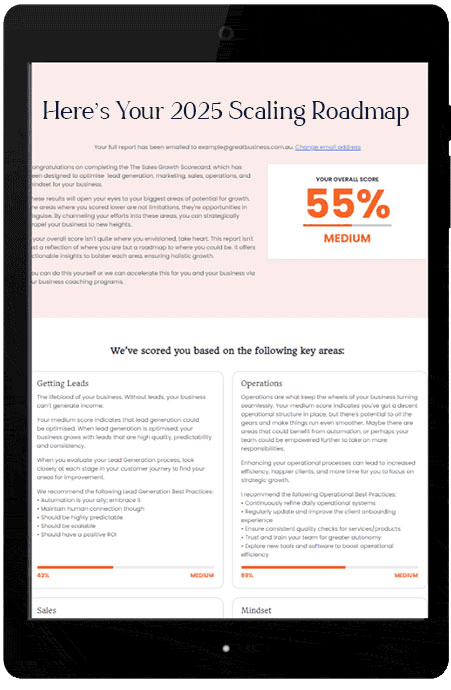
Why you should work on your business versus in your business
Do you feel like you’re on a hamster wheel trying to keep up with all the things you need to do to keep your business running?
When I started my first business, Finlee and Me, almost 8 years ago I didn’t have a freaking clue what I was doing. In fact, when it came to running the business I was working IN my business and not ON my business. I knew if I wanted to run a successful business I couldn’t keep doing what I was doing. I had to find the balance between working in my business and on my business.
It’s very easy to get bogged down in the stresses of day-to-day operations. You can soon feel like you have no time to step aside and analyse how your business is going, let alone any time to get creative or innovative about your future. But finding a way to work on the business not in the business sets your business up to thrive.
Having made the switch to a balanced approach of working IN my business and ON my business, I’ll share with you the game changers when it comes to getting the balance right.
Work On Your Business vs In Your Business
From experience, I know that working IN your business is something you can easily get carried away with, and if you’re not careful it can take up weeks at a time.
Working ON your business however can easily be done if you can delegate these tasks to your team or hire someone to cover those ‘IN’ tasks. If you’re just starting out you may need to do these IN tasks too but you’ll need to strategically plan your time.
We can’t find more hours in the day, so the best solution is to free up some of the time you’re working in your business so you can use those hours to work on it.
If you’re a typical small business owner, there’s a good chance you’re at least thinking about, if not working seven days a week. You need to find a way to stop long enough to work on future ideas and goals for your business
Maybe there are some tasks you need to let go of. It can be tough letting go of control but having someone else do some of the tasks for you will free you up to focus on some of the more strategic things your business needs.
What Is Working IN your Business?
Working in your business is any part of the day to day operations.
Working in your business includes doing anything for your customers/clients that is generating income. In addition, working in your business means you are “spending time” doing the mundane things you have to do each day. This could be:
- Meeting with clients
- Answering any queries you may get
- Processing orders
- Invoicing, chasing invoices and paying them
- Scheduling meetings, Zoom calls and conferences
- Dealing with an unexpected crisis
Larger businesses may have individuals or even a team working on each area of the day to day operations. But many small business owners find themselves responsible for everything. That leaves little time for much else.
What Is Working ON your Business
Working on your business means you’re investing time to look more at the big picture and to make it a better business than what it is today.
Through this process, you are making strategic decisions and ultimately strengthening the foundations for your business to grow and leverage up. Here are some examples of working on your business:
- Creating a strategic plan
- Developing or sourcing new products or programs
- Growing your connections through networking
- Creating educational material, including podcasts and blogs about business
- Marketing your business to find new customers/clients
- Creating systems and processes
- Hiring new staff or outsourcing tasks
- Talking with a mentor or business consultant
Looking at this list, it’s easy to see why these things easily get relegated to the bottom of the list. Almost all of them need you to step away from what your business actually does. And that’s hard when you’re entrenched in the day to day tasks.
Why It’s Important To Work On Your Business
The only person who is motivated to grow your business is you.
The business model where you are everything to everyone and don’t focus on your business provides little room for it to adapt or thrive.
Firstly, your business is not likely to grow, in fact, it will likely shrink. Rarely are there any aspects of a business that are just set and forget. Your website, for example, needs a great setup to start with, but if you want to continue to be found, you either have to spend good money on SEO or SEM strategies or be proactively blogging on your page.
Here’s a few key reasons why it’s important to work on your business:
It lets you identify what’s working and what’s not
Looking back is sometimes just as important as looking forward. Are there things that just aren’t working? Processes that need improving? Or products that are missing their mark?
Helps your business stay relevant
In this fast-paced, ever changing world it’s important to be able to stay relevant. If you’re so busy working in your business you’re unlikely to be keeping an eye on changing or emerging trends.
Being involved with broader industry related activities and initiatives will help you keep your finger on the pulse. It will also help you create valuable connections to develop your industry as a whole. So although you may view some of these people as competitors, working together to strengthen your industry can benefit all.
Set goals and think about the future
As a business owner starting out, you more than likely created an image in your mind of what your business looked like in a couple of years’ time.
But did you plan how you’d get there? Set goals and milestones? Know what steps you’d need to take to reach that point?
Setting down at least some goals and the steps you’ll take to get there can help you keep your business on track. All too quickly you’ll be absorbed with the everyday, so some planning will let you keep one eye on the future.
How To Work On Your Business More Effectively
As a small business owner one of your biggest challenges is likely to be finding enough time in the day to do everything. All too often working “on” your business is one of the first things to get put on the back burner.
But what if you could get back some precious time so you could devote it to working “on” your business?
Here are some suggestions to help you include
Play to your strengths
Using your time to do the things you’re good at will give your business a lot more bang for buck than if you struggle with a task you know little about.
Is cleaning the office, or doing late night deliveries really the best use of your time? Think about where you best provide value to your business and make those things your priority.
As the owner, you’re the one who has the vision for how you want your business to look in the future. It makes sense for you to be spending some time on making that happen.
Engage others to do things you aren’t good at
With a finite number of hours in a day, running a small business can be challenging. Regardless of how smart or how hard you work, there will always be something else to do.
While it’s tough to hand over tasks to others, or to make the financial commitment to pay someone else, this is one of the best ways to free up some time so you can work on your business. Hire your weaknesses.
Remember though, that if you don’t schedule your “freed up” time specifically for that purpose, it will quickly get chewed up doing something else.
Create the mindset that the time you allocate to working on your business is non-negotiable.
Allow yourself time to think
Space and time often bring clarity. Taking a small step back will allow you to see the business as it really is. And allow you to focus “on” it without the constant distractions of everyday operations.
Working on your business is often best done away from the business. Although you’ll want your team involved in the process at different times, some space can bring your creative best to the table when working on your business.
Automate where you can
Automating processes where you can, is one of the most efficient and cost effective ways to free up time. Automating things like sales order, invoices and some email communications can all save you valuable time.
And it doesn’t mean you won’t provide an exceptional customer experience. Many automation tools are sophisticated and capable of providing seamless interactions with your customers.
Where to From Here
Creating space in your busy day to day business operations is challenging. But it’s essential to give yourself the opportunity to work “on” your business.
Working on your business will help it grow, stay relevant and give you and your team clear direction to work toward your goals.
No matter what your business does, you will still need to work IN your business just as much as you are working ON your business. If you don’t work IN your business to make money your business is going to fail. However, if you don’t work ON your business then your business will never reach its full potential and will become stuck with little growth.
The key ingredient to success: schedule time to work on your business vs in your business every day. I personally have my power hour where I shut down all social media, turn off my phone and only work on tasks that are going to allow me to grow my business such as: planning my women’s business retreat, creating my signature coaching program for start-ups and small business owners or I head to an event to network and grow my connections. If you can’t do a power hour then start with 30 minutes a day, and you’ll start to notice a shift in your business almost immediately.
What are you doing to work on your business vs in your business? Let me know below as I love hearing about what businesses are doing to grow.










